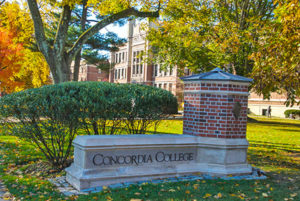More employees accuse Concordia College of denying severance payments
Twenty-six former faculty and staff of Concordia College are demanding $4.3 million in severance payments that they claim the college refused to honor after it closed this past June.
The employees accused the college of inducing them to continue working through the last semester, in a complaint filed Nov. 19 in Westchester Supreme Court, by assuring them that they would receive severance payments.

Instead, they claim, the college offered take-it-or-leave-it separation payments, regardless of how long they had been employed, “and only if they agreed to release Concordia from any claims they might have for payment-in-full of what they are owed.”
Kevin P. McDonough, the attorney handling Concordia’s transition, responded that “closing a college presents a very complicated, complex and difficult situation with many considerations and requirements to be addressed. Concordia has tried under these challenging circumstances to treat its faculty and staff fairly, equally and with dignity.”
Concordia was a four-year liberal arts school affiliated with the Lutheran Church – Missouri Synod. It was founded in Manhattan in 1881, relocated to Hawthorne, and moved to Bronxville around 1910.
Employees were notified in March that the institution was closing at the end of the spring semester. Iona College of New Rochelle announced in May that it was buying the 28-acre campus for its health sciences programs.
Westchester Supreme Court Justice Lawrence H. Ecker approved the $30 million sale on Nov. 8, under the Not-for-Profit Corporation Law, and ordered the college to set aside $3 million as reserves for paying potential liabilities to faculty and staff.
The lawsuit mirrors a pending complaint filed in September by former business professor and administrator William M. Salva.
Salva claims he was fired, according to his complaint, whereas Concordia says he resigned voluntarily and was not eligible for separation pay. He is demanding $807,000, bringing the total amount demanded by former employees to nearly $5.1 million.
Both cases focus on how severance payments are calculated, as set by employee contracts and the faculty handbook.
Tenured professors, for example, are entitled to five years of full salary and benefits, according to the new complaint, plus a separation payment based on their years of service. Staff members are entitled to two weeks of salary for every year of service, up to six months of severance payments.
The amounts allegedly owed to 22 faculty members range from $495,611 for tenured social work program professor Joan Adams, to $8,077 for assistant professor of English Alison Matika.
Four staff members are claiming from $15,458 to $7,178.
The complaint does not detail how much Concordia offered each employee.
In February, the head of the Concordia Board of Regents, Joseph Carlin, asked the staff in a Zoom meeting to remain on the job through the end of the spring semester, according to the complaint, and assured them that they would receive severance payments.
Carlin and John A. Nunes, the college president, allegedly denied knowing of any change in severance policy.
In March, the college notified faculty that their positions were being terminated and they would be paid through Sept. 8, or for tenured professors through March 8, regardless of the time remaining on their contracts.
But in a Zoom meeting later that month, Carlin allegedly assured the faculty that they would be paid severance, “to induce the faculty to continue teaching until the end of the semester.”
Then, just as the semester was ending, the complaint states, Concordia denied that it owed severance to anyone.
“Concordia took the position that it had repealed that provision in its faculty handbook calling for severance to be paid based on length of service,” the complaint states, “and argued that its having been restored in more recent versions of the faculty handbook was ‘unauthorized.'”
Severance provisions in the faculty handbook “were never adopted or approved by the college,” Concordia’s attorneys argued in a footnote in an Oct. 27 memorandum of law in the Salva case, “but instead were created from whole cloth by a disgruntled former employee.”
The memo does not identify the disgruntled employee or offer any details of the circumstances.
Scarsdale attorney Robert B. Bernstein represents Salva and the additional 26 faculty and staff.